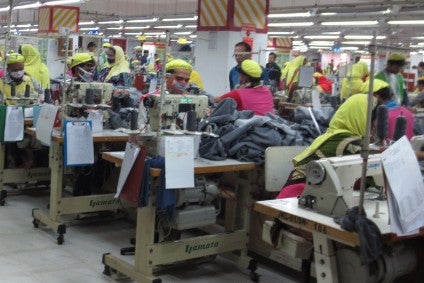
Bangladesh’s trade unions are again pushing for what they call “rational” minimum wages for workers in the country’s US$28bn garment industry – demanding a tripling in rates.
At a crowded press conference on Sunday (24 February), at the headquarters of the Dhaka Reporters’ Unity media organisation, the IndustriAll Bangladesh Council (IBC) proposed hiking wages for an entry-level apparel worker to BDT16,000 (US$192) a month from the current US$68 set in 2013 after the Rana Plaza collapse.
The IBC also proposed raising the minimum wage system’s mandatory annual increment pay rises for workers staying in the same job to 10%, up from 5% now.
The proposals came a month after the government of Prime Minister Sheikh Hasina formed a seven-member minimum wage board to recommend fresh pay for an estimated four million apparel workers.
In the present condition, “a worker can’t support himself or herself, let alone their families,” says Towhidur Rahman, secretary-general of the Bangladesh IBC, which is linked to the Geneva-based IndustriAll global union
Rahman stresses that Bangladesh has been experiencing inflation, especially on essentials, notably in rice and onion prices, and spiralling house rents along with rising education and health expenditure.
How well do you really know your competitors?
Access the most comprehensive Company Profiles on the market, powered by GlobalData. Save hours of research. Gain competitive edge.

Thank you!
Your download email will arrive shortly
Not ready to buy yet? Download a free sample
We are confident about the unique quality of our Company Profiles. However, we want you to make the most beneficial decision for your business, so we offer a free sample that you can download by submitting the below form
By GlobalData“Owners never track how workers and their families are faring against this backdrop,” he explains.
Of the proposed wages, BDT10,643 would cover basic monthly expenses, BDT4,257 for average house rents, BDT650 food and BDT250 and BDT200 for medical and conveyance allowances respectively, he says.
The union is also proposing simplifying standard clothing and textile wage structures, reducing seven grades to five, proposing that workers should regularly move up through these stages.
Anticipating possible objections from business leaders, Amirul Haque Amin, president of the National Garment Workers Federation, says Bangladesh clothing and textile industry workers’ wages today account for only 3% of production costs in the country.
So this sharp rise in wages would only increase that proportion to 6%. “This won’t have any impact,” he says, dismissing factory owners’ fear that the industry would not survive such a wage hike.
Nazma Akhtar, president of the Sommilito Garments Sramik Federation, wants the government to introduce a rationing system to help workers offset the impact of price hikes that often follow wage increases. She is also demanding that the government provide cash subsidies for workers in its next budget.
This is the second time in a month that Bangladesh labour rights groups have pushed for increased pay for garment workers.



